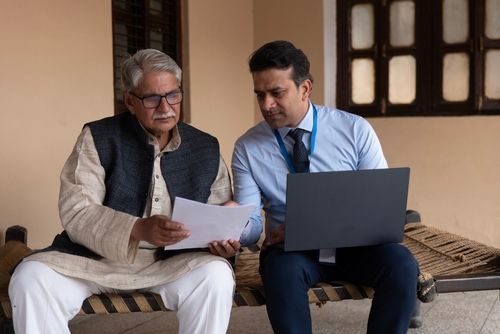Advantages of buying Term Insurance early in life
Written by Upstox Desk
Published on July 15, 2025 | 5 min read

Introduction
Aryan, at 18, got his first job when his father, Raj, gifted him a term insurance policy. Aryan, expecting something flashy, was disappointed, questioning the value of such a gift and the years of premiums with no immediate benefit. Raj explained that starting early locks in low premiums, ensures long-term coverage for life milestones, and combats inflation's effects. While Raj saw it as a smart financial step, Aryan remained skeptical about its relevance and long-term commitment.
So, who is right? Raj, with his perspective on the importance of starting term insurance early, or Aryan who is skeptical about the need for such a policy at a young age? Well, let's read on and find out.
Lower premium
The first and foremost benefit of getting a term insurance policy early in life is the lower premium. Though the premium amount is typically fixed for the policy's duration in a term insurance policy, several factors are also included in calculating the premium.
These factors generally include age, pre-existing medical condition, overall health of the policyholder, life expectancy, etc. Therefore, starting early locks in a lower premium for the same coverage period because younger individuals are considered lower risk.
That is why Aryan has to pay significantly less than his father, Raj, for the same policy. So, when Aryan, at 18, takes a ₹1 crore term insurance policy, his premium is set at ₹10,000 annually due to his young age and good health, locking him in at this rate for 40 years. However, when Raj, at 48, applies for the same policy, his premium comes around to be ₹45,000 annually due to his higher age and the associated risks.
Better benefits
A term insurance policy's death benefits are decided based on several factors. However, the primary objective of the benefit is to cover a person's financial responsibility in case of death. As young adults have a lower death risk and high earning potential, they qualify for better benefits.
They can even get maturity benefits, which are unorthodox benefits of a term insurance policy. This benefit is a bonus because, unlike most term policies where the benefit is only paid out after death, this maturity benefit provides the policyholder with an additional financial cushion if they outlive the policy's term.
Longer tenure
While we appreciate a good term insurance policy, the appreciation is usually based on factors like premium costs and maturity benefits. One crucial factor that we tend to ignore is policy tenure. The actual rate of premium and maturity benefits are relative to the policy's tenure.
For instance, if Aryan takes the ₹1 crore policy now with a ₹10 lakh premium for 40 years, the cost of the premium is locked in for that entire term. However, if he waits 10 years and takes the same policy, his premium could increase, and the coverage term would only be 30 years, even though the total premium amount for both cases might still be the same.
Inflation cover
One of the biggest myths regarding term insurance policy is that you lose money to inflation if you get a term insurance plan. And the sooner you get the policy, the more money you will lose. In reality, inflation coverage is one of the lesser-explored benefits of having a term insurance policy.
So, if Aryan puts ₹20 lakh aside today, he needs it to grow to ₹30.4 lakh in 7 years to beat 6.5% annual inflation. Now, Aryan has a few options to choose from:
-
He can keep the cash at home. However, here, the value will drop to ₹12.7 lakh in 7 years, losing ₹7.3 lakh due to inflation.
-
If he puts the money in a bank savings account with 3% interest, it will grow to ₹24.6 lakh, still falling short by ₹5.8 lakh.
-
With a fixed policy (no inflation adjustment), Aryan will receive ₹20 lakh at the end of the term, losing ₹10.4 lakh in value due to inflation.
-
Finally, with an inflation-linked insurance policy, the amount will grow to ₹30.4 lakh, fully protecting his money's value and providing stability against inflation.
The catch here is that not all insurance policies are inflation-adjusted. If you want your policy to adjust for inflation, you'd need to specifically opt for an inflation-linked rider or policy when purchasing or renewing your insurance. Typically, qualifying for such policies as a young adult is easier.
Summing up
Financial planning is a marathon, not a sprint, and the earlier you start, the more you gain. It makes starting early financially more advantageous. By starting early, you pay a lower average premium and get longer coverage, while waiting results in higher premiums for a shorter term.
As a young adult, you benefit from better maturity coverage options and even enjoy inflation-linked components. However, it's essential to carefully check the terms of the policy to understand how it deals with these benefits.
FAQs
Why are premiums lower when you buy term insurance early?
Premiums are lower for younger policyholders due to their lower risk and higher life expectancy.
Can term insurance policies offer benefits if I outlive the term?
Yes, some term insurance policies offer maturity benefits if you outlive the policy term, providing an additional financial cushion.
How does a term insurance policy protect against inflation?
Term insurance can include inflation-linked riders that adjust the benefit amount over time to keep pace with inflation, protecting your investment's value.
Is it more cost-effective to start a term insurance policy at a young age?
Yes, starting young allows you to lock in lower premiums for a longer duration, making it more cost-effective over time.
About Author
Upstox Desk
Upstox Desk
Team of expert writers dedicated to providing insightful and comprehensive coverage on stock markets, economic trends, commodities, business developments, and personal finance. With a passion for delivering valuable information, the team strives to keep readers informed about the latest trends and developments in the financial world.
Read more from UpstoxUpstox is a leading Indian financial services company that offers online trading and investment services in stocks, commodities, currencies, mutual funds, and more. Founded in 2009 and headquartered in Mumbai, Upstox is backed by prominent investors including Ratan Tata, Tiger Global, and Kalaari Capital. It operates under RKSV Securities and is registered with SEBI, NSE, BSE, and other regulatory bodies, ensuring secure and compliant trading experiences.

























